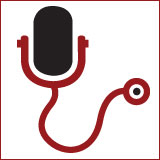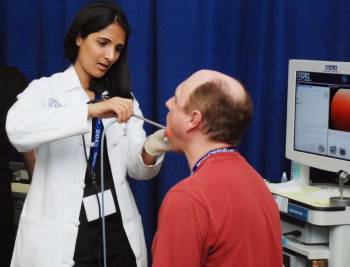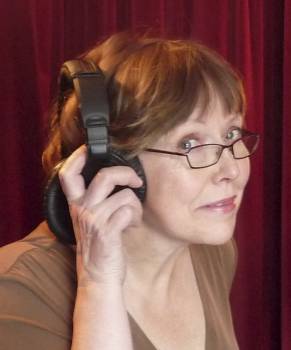|
VOCAL HEALTH - Part 3 Scope Out Your Problems ... Need Surgery? Finding Doctors ... Beware Side Effects  By
Elizabeth Holmes By
Elizabeth Holmes
Voice Actor & VOXtra Staff Editor See Part 1 See Part 2 Years ago, I had the privilege of attending a friend’s birthday party where Ella Fitzgerald provided the evening’s entertainment. She was nearly 70 years old at the time, and her voice was still magnificent. What are the odds that your voice will still be going strong in your later years? Much depends on how you take care of it now. "If I could give two pieces of advice to voice talent,” says Dr. Reena Gupta, director of the Voice & Swallowing Center at Osborne Head & Neck Institute in Los Angeles, "they would be: one, get a baseline exam from a qualified laryngologist as early in your career as possible, and two, invest in your voice.”  Dr. Gupta
(pictured) specializes in caring for professional voices. And her passion for medicine is matched by her love of vocal arts. Dr. Gupta
(pictured) specializes in caring for professional voices. And her passion for medicine is matched by her love of vocal arts. In addition to Board Certifications in otolaryngology (ear, nose, throat - ENT) and laryngology, Dr. Gupta’s professional credentials include a prestigious Fellowship in Laryngology and Care of the Professional Voice (under the guidance of world-renowned voice specialist Dr. Robert Thayer Sataloff). She has extensive experience in managing a wide variety of complex voice disorders. VOICE EVALUATION - NOT ENT "People think going to an ENT is an appropriate way to have your voice evaluated,” Dr. Gupta explains. "It’s not. Many ENTs don’t get enough voice training. "The average amount of voice training a doctor receives in five years of residency is three months," she explains. "Sometimes it’s only one week!” So, what’s the difference between having your voice evaluated, and a standard ENT exam? "In my opinion,” says Dr. Gupta, "a proper voice evaluation must include stroboscopy, not just a standard scope [flexible laryngoscope]. WHAT'S THE DIFFERENCE? "A standard scope is the flexible scope that passes through your nose; this catches about 10% and gives a gross overview," Dr. Gupta explains. "Stroboscopy is a rigid scope that passes through your mouth, and provides the illumination, resolution and slow motion that’s needed to give a proper view of all structures, as well as correctly identify problems such as masses and polyps.” Flexible laryngoscopy does not provide the illumination and resolution of stroboscopy, she adds. Without that added information, ENTs often struggle to explain a voice user’s problem. ACID REFLUX OFTEN BLAMED Acid reflux is an easy explanation that has become the "go-to diagnosis” for ENTs, and which often results in treatment for acid reflux. Of course, sometimes swelling actually is caused by acid reflux. "Good abdominal support is important for vocal performance, and all that pressure can cause stomach acid to be squeezed up," Dr. Gupta notes. "But there are other reasons for hoarseness - and without stroboscopy, it’s extremely difficult to correctly identify them.” SCREAM AT YOUR PERIL What vocal health issues are most often seen by Dr. Gupta? "The most common problems I see among voice actors are injuries from screaming and shouting," she says. "Nine times out of ten, it’s from doing video games and animation. "That kind of work is often very challenging and taxing to the voice. Sometimes," she warns, "it can cause irreversible damage.” IF YOU NEED SURGERY ... Any advice for voice actors undergoing surgery? "It’s not specific to voice actors, but anyone undergoing an operation that involves a general anesthetic needs to know the risks to their vocal health,” says Dr. Gupta. "You’re dependent on the skill of your anesthesiologist. That doctor needs to know how to place a tube down your throat properly. "Also, the longer the procedure, the greater the risk to your vocal health. You’ll have swelling, and you’ll need to plan for a period of complete vocal rest afterward. "And be sure to get checked for pre-existing conditions that could cause complications," she adds. "If you have a consultation with a skilled laryngologist before your operation, you’ll be prepared for unexpected outcomes. Thyroid surgery and cervical spinal procedures, in particular, are risky for vocal pros.” TO FIND A DOCTOR ... So, how do you find a doctor who can help you get the medical care you need? Vocal coach Bettye Zoller recommends: Look for board-certified physicians. Common areas of expertise include:
Also, Dr. Gupta has
graciously agreed to assist VoiceOverXtra readers find physicians specializing
in voice evaluations in their own parts of the country. Contact her
through: www.ohni.org/contact.php.
Also check out www.ohniww.org for more information on vocal health topics. BE AWARE OF SIDE EFFECTSWhen consulting physicians for other health issues, be sure to know how potential drug side effects may impact your vocal health. Dr. Kenneth W. Altman, Director of the Eugen Grabscheid MD Voice Center, and Associate Professor of Otolaryngology at Mount Sinai School of Medicine in New York City cautions: "Medications can have unintended side effects on your larynx. These include medications prescribed by your doctor, over-the-counter preparations, and homeopathic/herbal remedies." Dr. Altman suggests paying particular attention to the following: Medications that may dry your vocal folds, including:
The topic of vocal health could easily occupy a book, but we hope this series of articles has helped you to gain some practical tips for staying in shape (Part 1), raised your awareness about the importance of taking timely action to treat problems (Part 2), and presented useful information about working successfully with you own doctor to keep your voice in great shape (this article). With proper care, you may end up giving Ella a run for her money! ABOUT ELIZABETH ...  Author Elizabeth Holmes is a voice actor, writer and audiobook narrator based in Healdsburg, CA.
She is also editor of VoiceOverXtra's eBook division. Author Elizabeth Holmes is a voice actor, writer and audiobook narrator based in Healdsburg, CA.
She is also editor of VoiceOverXtra's eBook division.Email: Elizabeth@HolmesVoice.com Web: www.HolmesVoice.com |
As of the NEW website launch, 03/22/2012









.png)
Elizabeth,
With great interest, I read your Vocal Health series. Your writings prompted my response, beyond appreciation, for two other reasons:
One is, I think I've finally beat a nagging mouth click problem I've always had (mostly successful editing them out but not always). Not wet sounds, not dry sounds nor pops: clicks. It came from a certain tense-ness I'd bring to the mic. Not nervousness but a certain kind of mouth/throat constriction. I recently had a few unrelated sessions with a personal trainer at my gym who stretched me out in ways I couldn't have imagined. When we went as far as we thought we could go, I'd find 'a place in my head' to relax further, and deeper relaxation set in. I could go on, but wanted to offer, from a health POV, that in care for the total body, benefits for the voice can be realized. The relaxation I now bring to the mic - that loss of tension - all but made those clicks disappear.
Then, separately, a dear friend (not in voice work) has been going through a hell I couldn't have imagined. She was misdiagnosed three times for having lost her ability to speak: first, Bell's Palsey; TIA's (some mini-strokes!); tumor; then finally a non-malignant mass on her brain. Sub-standard medical attention aside, one must wonder, if one's livelihood depends on talking and events like this happen, what's your Plan B?
Best regards, Ken Karp